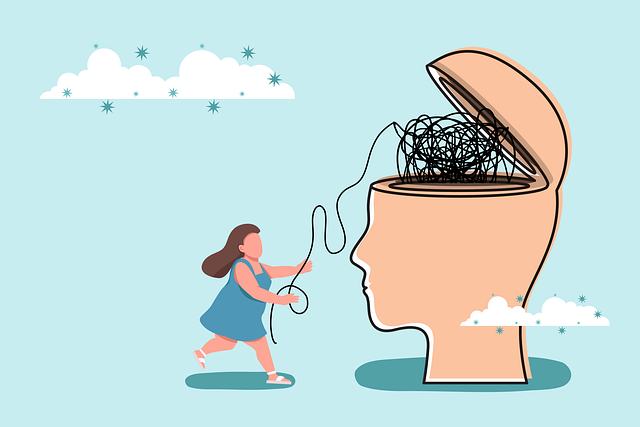Burnout among healthcare providers specializing in therapy for adults who have experienced domestic violence is a pressing issue due to high-stress work environments. To combat this, organizations should create supportive cultures emphasizing resilience, communication, and collaboration, along with providing access to therapy resources and support groups. Evidence-based therapies like CBT and trauma-informed practices are key to preventing burnout and improving patient outcomes. Encouraging self-care practices and providing coping skills through therapy can reduce burnout risk and enhance job satisfaction.
Healthcare provider burnout is a growing concern, impacting not just individuals but the entire healthcare system. This article explores comprehensive strategies to prevent burnout among healthcare workers, focusing on understanding its causes and effects, specifically within the context of domestic violence therapy for adults. We discuss the importance of supportive work environments, evidence-based therapies for stress management, and the adoption of self-care practices to foster resilience.
- Understanding Burnout Among Healthcare Providers: Causes and Impact
- Creating Supportive Work Environments to Combat Burnout
- Evidence-Based Therapies for Stress Management and Resilience
- Fostering Self-Care Practices and Healthy Lifestyle Choices
Understanding Burnout Among Healthcare Providers: Causes and Impact

Burnout among healthcare providers is a growing concern, affecting not only individual practitioners but also patient care and overall healthcare systems. It manifests as a state of emotional exhaustion, depersonalization, and reduced personal accomplishment, often stemming from prolonged exposure to high-stress environments. Healthcare professionals, especially those in direct patient care, frequently encounter challenging situations such as managing acute illnesses, dealing with limited resources, and navigating complex ethical dilemmas, which can contribute to burnout over time.
The impact of burnout is profound. It can lead to decreased job satisfaction, increased turnover rates, and potential harm to patients due to reduced clinical performance. In the context of therapy for adults who have experienced domestic violence, burnout can exacerbate existing trauma and hinder a healthcare provider’s ability to offer compassionate support. Therefore, understanding and addressing burnout through effective strategies like empathy building and compassion cultivation practices are essential components of mental health awareness initiatives within healthcare settings.
Creating Supportive Work Environments to Combat Burnout

Creating supportive work environments is a vital component of burnout prevention strategies for healthcare providers, particularly in light of the challenges often faced by those who treat survivors of domestic violence. Therapists working with adults who have experienced trauma must themselves be equipped to manage stress and maintain mental wellness. This starts with organizational culture that prioritizes resilience building and open communication.
Implementing policies that foster collaboration, recognizing and rewarding employee efforts, and providing access to resources for therapy and support groups can significantly contribute to a healthier work environment. By addressing burnout at its root, healthcare organizations can enhance staff retention, improve patient outcomes, and create a more sustainable system of care, especially in specialized fields like domestic violence therapy.
Evidence-Based Therapies for Stress Management and Resilience

Evidence-based therapies play a pivotal role in preventing burnout among healthcare providers, especially those who have experienced or are at risk of domestic violence. Techniques like cognitive-behavioral therapy (CBT) offer practical coping skills development by identifying and challenging negative thought patterns. This helps front-line workers manage stress effectively, fostering resilience against the emotional toll of their work.
Additionally, therapies focused on trauma inform a crucial aspect of burnout prevention for survivors of domestic violence. These approaches provide safe spaces to process past experiences, promoting mental wellness journaling exercises that can help them reflect and grow. By integrating evidence-based practices into their routines, healthcare providers can enhance self-care practices, ultimately reducing the risk of burnout and improving patient care.
Fostering Self-Care Practices and Healthy Lifestyle Choices

Healthcare providers often neglect their own emotional well-being while prioritizing patient care. To combat burnout, it’s essential to foster self-care practices and healthy lifestyle choices. Incorporating regular exercise, mindfulness techniques, and adequate sleep can significantly reduce stress levels. Additionally, therapy for adults who have experienced domestic violence can provide coping skills development and compassion cultivation practices, which are crucial for maintaining work-life balance.
Emotional well-being promotion techniques such as meditation, journaling, and engaging in hobbies outside of work can serve as effective burnout prevention strategies. By adopting these practices, healthcare providers can enhance their resilience and better manage the emotional demands of their profession. This, in turn, leads to improved patient care and overall job satisfaction.
Healthcare provider burnout is a significant issue, but through understanding its causes and implementing targeted strategies, we can create supportive work environments that foster resilience. Combining evidence-based therapies with self-care practices, such as those tailored to adults experiencing domestic violence, offers comprehensive solutions. By prioritizing well-being, we not only enhance individual healthcare providers’ lives but also improve patient care outcomes in the long run.










